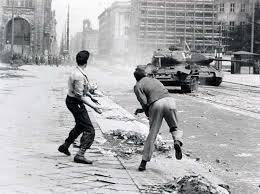On 16th June, 1953, building workers in East Berlin went on strike. The next day, more than a million people struck throughout East Germany, with demonstrations in 700 towns and cities. The initial demands were economic, but these were soon generalised, with demonstrators demanding free elections, the release of all political prisoners, and democratic trade unions. Soviet troops opened fire on protestors. 55 people were killed throughout East Germany and more than 15,000 arrested. 1,500 were given lengthy prison sentences.
In response to the Uprising, Communist poet/playwright Berthold Brecht, who was living in East Germany, wrote the sardonic poem The Solution, in which he asked: “Would it not be easier In that case for the government To dissolve the people And elect another?” He then hid the poem in a desk drawer and it was not published until 1959, 3 years after his death. Brecht supported the uprising but retained some loyalty to the East German régime.
Western politicians used the uprising for Cold War propaganda – the street leading to Brandenburger Tor was renamed Straße des 17. Juni, and 17 June was declared a public holiday in West Germany. But some Western leaders were scared. US military officer Karl F Mautner recalls commandants saying: “Got to be careful that we don’t have a revolt spilling over into our part of the city.” This was, above all, a workers’ uprising against an authoritarian government and not an anti-Communist one.
The Uprising of 1953 was important as, at the height of the Cold War, it pointed a way towards a different sort of politics, of a fight not between West and East but between below and above – against rulers on both sides of the Iron Curtain. It was followed by uprisings in Hungary in 1956, Czechoslovakia in 1968, and Poland in 1980, just as workers in the West fought their own rulers. This was our fight, and we should not let Western propagandists claim credit.




